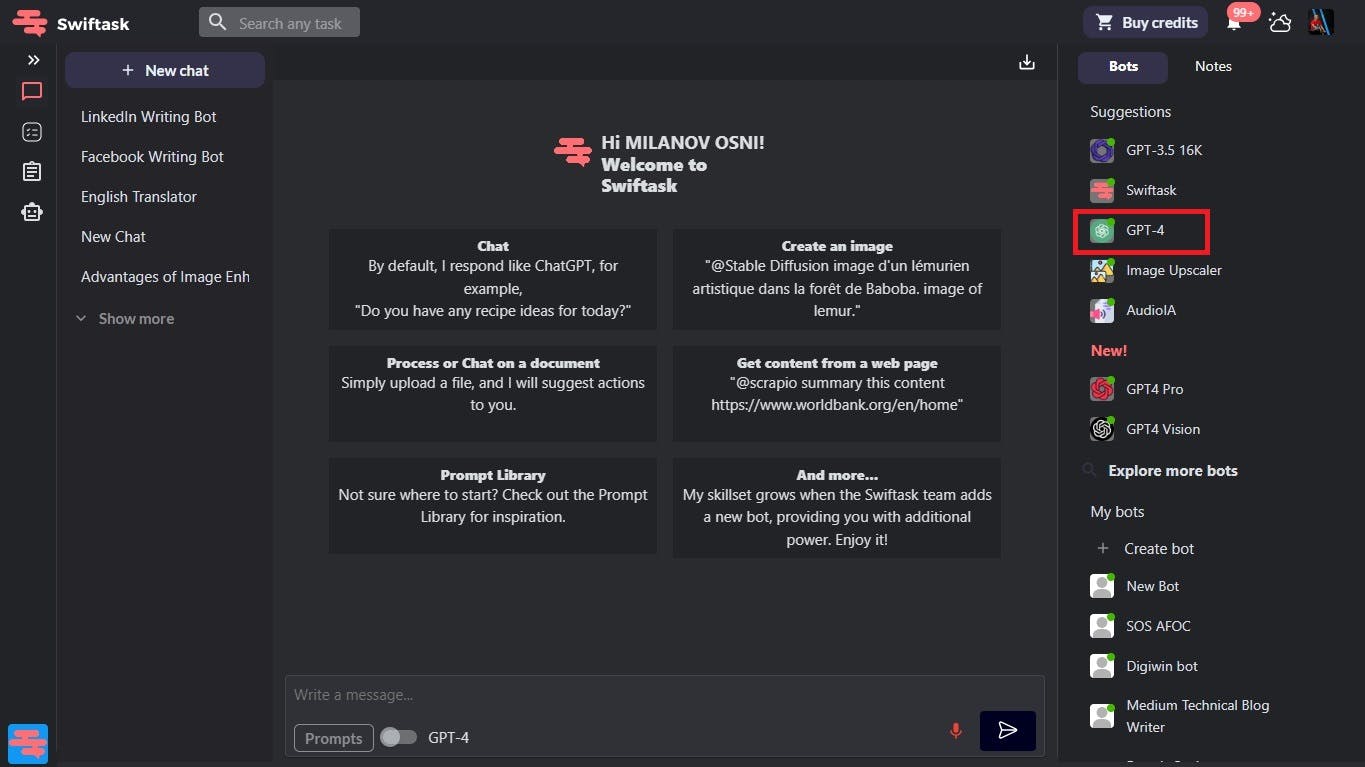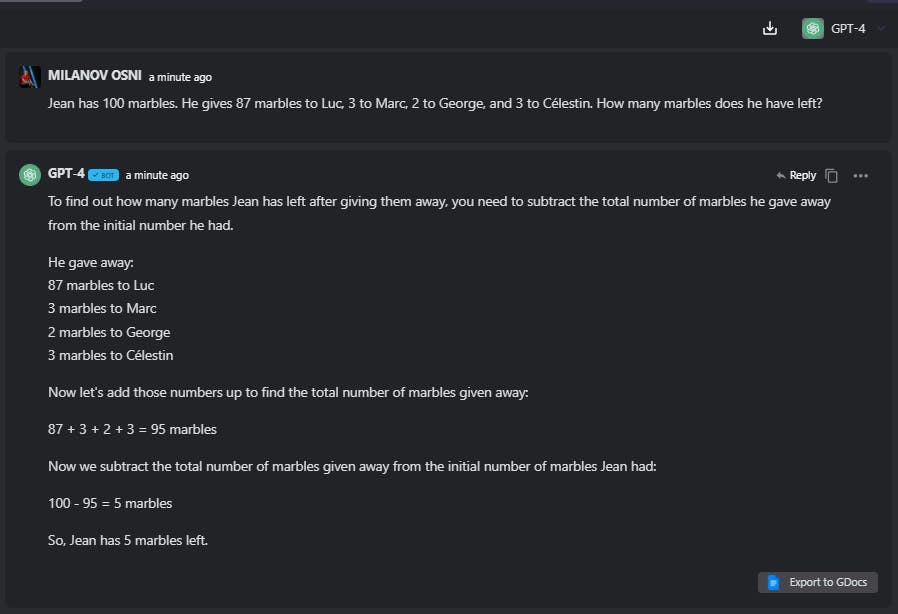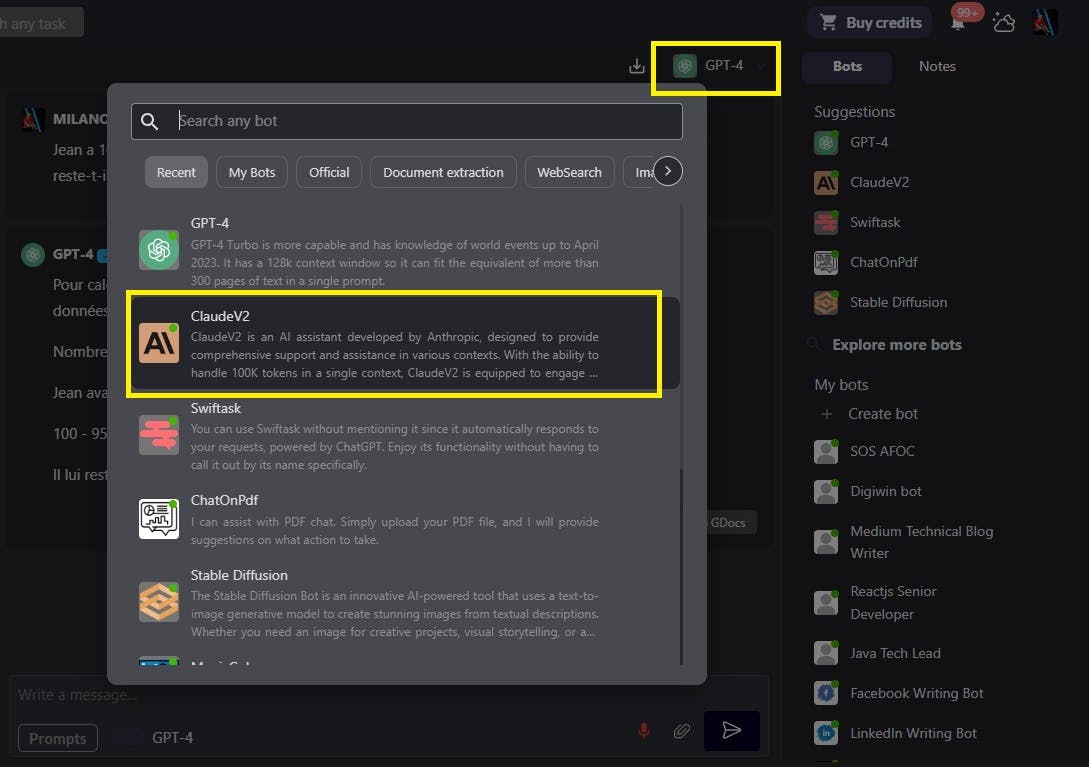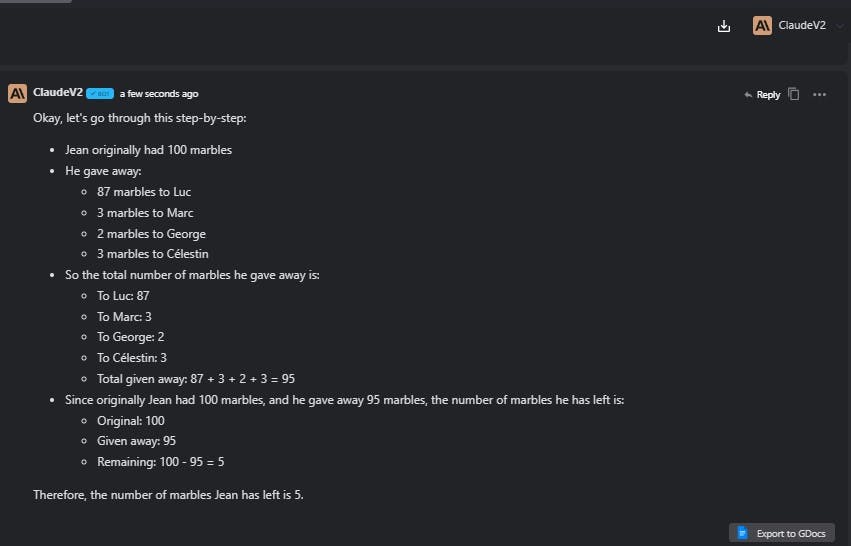Table of contents :
Claude 2 vs GPT-4
Ready to transform your business with AI?
Discover how AI can transform your business and improve your productivity.
This Claude 2 vs GPT-4 comparison helps you see clearly
With an almost human-like conversational engagement, the ability to create sophisticated texts, and custom programming, Claude 2 and GPT-4 stand out as giants in the field of artificial intelligence. But beyond their accomplishments, their performances diverge in terms of efficiency, accuracy, cost, ethical approach, and many other essential aspects. What are the specificities of these cutting-edge AI systems? Our detailed comparative analysis weighs Claude 2 and GPT-4 against various essential criteria. We scrutinize their speed, range of features, accuracy in specialized fields, security, and other key elements to uncover their strengths and limitations. Dive into our comprehensive evaluation to identify which AI system aligns best with your specific requirements and practical applications for 2023 and beyond. This comparison is crucial for those seeking to grasp the opportunities offered by the most sophisticated AI technologies currently available on the market.
Claude 2's capabilities
What makes Claude 2 unique?
Artificial intelligence system Claude 2 represents a significant advancement in natural language understanding. Its architecture, designed to better comprehend and interact with users, is revolutionizing the field of chatbots. With exceptional adaptability, Claude 2 promises a smoother and more natural user experience. Its friendly tone and responsiveness distinguish it as a vital tool for online interactions, radically changing the way businesses communicate with their customers.
Claude 2 in the professional world
Beyond mere conversation, Claude 2 integrates into the professional world with its advanced functionalities. This AI tool optimizes customer relationship management, data-driven decision-making, and team productivity. Its contextual understanding and ability to provide relevant answers make it indispensable for automating support services and real-time data analysis. Companies that adopt Claude 2 benefit from a notable competitive advantage in terms of operational efficiency and agility.
Speed: Claude 2 is fast
From the beginning of testing with Claude 2, the impression is striking: the speed of this model is incredible. Significantly faster than GPT-4, Claude 2 excels in accelerated response processing. The design of Claude 2 is clearly focused on delivering spectacular performance in instant text generation, providing a notable advantage for use cases that require real-time responses. This speed-optimized efficiency makes Claude 2 a preferred choice for those looking to integrate AI into processes where every second counts.
Constitutional AI: Ethics integrated at the core of Claude 2
The Claude 2 system stands out through the implementation of constitutional artificial intelligence, an innovative methodology that integrates ethical principles at the very core of its AI architecture. Constitutional AI equips Claude 2 with fundamental ethical principles inspired by human rights, essentially forming its own "ethical charter." The model is specifically trained to operate in accordance with this charter. In Claude 2, this ethical charter serves as a compass, guiding the system to avoid any biased, dangerous, or harmful behavior. It provides an ethical framework that directs the AI's decision-making process, aligned with human moral principles. Thanks to this, Claude 2 is capable of automatically rectifying certain biases without depending on human moderation for every instance. In contrast, GPT-4 does not benefit from constitutional artificial intelligence. It relies more on human analysis and reactions to adjust its problematic responses retrospectively. Unlike Claude 2, GPT-4 lacks a proactive mechanism to immediately avoid unethical behaviors instead of gradually correcting them. The advantage of constitutional AI lies in its proactive ability to prevent the generation of harmful content before it even occurs, rather than reacting to negative incidents. This advancement positions Claude 2 as a pioneer solution in integrating ethics and security throughout its development.
Code comprehension: Claude 2 outperforms GPT-4
The performance of Claude 2 in computer programming is remarkable, surpassing GPT-4 significantly in the development, understanding, and explanation of specific code segments. Claude 2 demonstrates superior expertise in the field of software development, marking a major advancement in AI-assisted programming.
Exploring the Strengths of GPT-4
The Versatility of GPT-4 Explained
Launched on March 14 and made available on July 7, 2023, GPT-4 is a dominant force among language models thanks to its astonishing versatility. Its ability to generate coherent and contextually appropriate text makes it a multifunctional tool used for both content writing and programming. With deep learning capabilities, i.e., knowledge updates until April 2023, GPT-4 can assist in a wide range of fields, from literary creation to complex computer codes. This versatility allows GPT-4 to adapt to almost any use case, making it extremely valuable in creative, educational, and technological sectors.
GPT-4 and Its Impact on Education
The impact of GPT-4 in the education sector is considerable. As a learning tool, it helps students deepen their knowledge by generating clear explanations and concrete examples. Educators rely on GPT-4 to personalize teaching and provide educational resources tailored to each student. Additionally, GPT-4 can stimulate engagement and curiosity among students by asking thought-provoking questions or presenting imaginative scenarios, making it a valuable ally in modernizing pedagogical approaches.
Factual Accuracy: GPT-4 currently more precise
When it comes to general knowledge questions, GPT-4 tends to deliver more reliable answers. Although Claude 2 may occasionally make factual errors. This is due to a larger database used to train GPT-4, allowing for better fact-checking. However, it is expected that Claude 2 will continue to improve over time. Currently, for accurate information, GPT-4 is slightly superior. It proves to be more reliable than Claude 2 in providing correct factual data in the majority of situations. However, it is important to note that neither GPT-4 nor Claude 2 are infallible. Errors can occur from both. At this stage, GPT-4 holds the advantage when it comes to sharing accurate and up-to-date information. It is still advisable to always proceed with further fact-checking.
Security: Both strong but GPT-4 has more resources
Claude 2 and GPT-4 have undergone rigorous security checks, with GPT-4 having a slight advantage due to increased investment from OpenAI in security auditing processes. So far, both AI models have proven to be robust, with no major vulnerabilities reported. The priority given to security by OpenAI may give GPT-4 a slight edge in terms of reliability in sensitive applications.
Performance Comparison
Claude 2 and GPT-4: Comparative Analysis
When directly comparing Claude 2 and GPT-4, distinct nuances in their performances can be observed.
- Claude 2 stands out for its nearly human-like interaction, while GPT-4 excels in versatility and its ability to handle a variety of tasks.
- In terms of responsiveness and relevance, both AIs are neck and neck, although Claude 2 was specifically designed to offer a more engaging conversational experience.
- However, GPT-4 surpasses Claude 2 in terms of creativity and broadening the possibilities of artificial intelligence applications.
Niche Accuracy: Claude 2 dominates specialized knowledge
Claude 2 is the preferred choice for specialists seeking precise AI in the legal and mathematical domains. In comparison to GPT-4, Claude 2 clearly stands out for the relevance of its responses in specific tasks. Additionally, Claude 2 excels in solving demanding mathematical problems, often providing relevant solutions accompanied by detailed step-by-step explanations. However, when it comes to general knowledge questions like identifying the author of the famous novel "The Great Gatsby," GPT-4 shows a better understanding of general information. In summary, Claude 2 surpasses GPT-4 by offering increased precision in niche areas such as law and mathematics. As for GPT-4, it remains the champion in general knowledge questions. These two AI models offer their own strengths, resulting in targeted expertise based on specific application domains.
Comedy: Both can generate humor
Although large language models (LLMs) are not inherently designed for comedic creation, it is still possible to use them to generate humorous content with appropriate guidelines. Through personal experiments, it appears that Claude 2 has a remarkable ability for humor, surpassing its counterpart in generating jokes and entertaining content. This suggests that, despite the absence of specific optimization for humor, Claude 2 can bring a touch of wit and levity, skillfully responding with humorous answers when prompted appropriately by users. For guaranteed amusement, try out Claude 2 and discover its unique approach to humor in AI-based interactions.
Data Management: Claude 2 ingests much more
Claude 2 stands out for its exceptional ability to process documents containing up to 100,000 tokens, providing a significant scope for analyzing large texts. In comparison, GPT-4 has a more limited capacity, processing approximately 4,000 words per prompt due to its contextual limit of 8,192 tokens. This distinction marks a considerable difference in favor of Claude 2, positioning this artificial intelligence as the top choice for users with high demands for volume of processed content. Indeed, in the contest for managing large documents, Claude 2 easily wins the "great processing capacity competition," asserting its competitive advantage in the field of language models through its high data tolerance.
Use Claude 2 or GPT-4 on Swiftask
Discover Claude 2 and GPT-4, the gems of AI, now integrated into Swiftask! These cutting-edge technologies reinvent virtual assistance. Simplify your daily tasks with innovation that adapts to your needs. The future of automation is here, within your reach.
Quick performance comparison: Claude 2 VS GPT-4 on Swiftask
Having read the article, you have an overview of the performance of each AI, whether it's Claude 2 or GPT-4. Now, we will show you a concrete advantage of the Swiftask platform achieved through these two extraordinary AIs. Indeed, Swiftask allows you to use Claude 2 and GPT-4 without having to open multiple tabs. Simply select the desired bot to process your request.

This is very convenient for comparing the answers of Claude 2 and GPT-4 on the same question. For example, let's try with this prompt: "Jean has 100 marbles. He gives 87 marbles to Luc, 3 to Marc, 2 to George, and 3 to Célestin. How many marbles does he have left?"

You can copy/paste the prompt to avoid having to rewrite it. Here is the answer from GPT-4 on Swiftask:

Then, just choose Claude 2, still on the same page, to get its answer to the same prompt:


Thus, with just a few clicks, you can compare the answers of the two AIs using Swiftask's unique interface. This is a significant time-saving compared to opening multiple tabs.
Multiple practical AI integrated into Swiftask
Swiftask provides access to numerous pre-integrated AIs. You can choose from this selection or even build your own custom bots. We offer a unified ecosystem that allows you to easily access multiple powerful AI bots through a single interface. Here are the bots you can use on Swiftask, your all-in-one AI assistant: Text generation bots: Swiftask: The default AI assistant that welcomes you and responds to your requests. GPT-3.5 16K: AI developed by OpenAI, capable of handling a context up to 16,000 tokens. GPT-4: More sophisticated AI developed by OpenAI, producing more reliable and beneficial responses. Cohere: A linguistic AI platform offering a chatbot equivalent to ChatGPT. It handles business operations, responds to customer queries, supports research and semantic analysis in 109 languages, and offers cloud storage. ClaudeV1: AI model optimized for tasks requiring more complex reasoning, equivalent to 9000 tokens. ClaudeV2: Produces longer responses and is suitable for conversation. Web-based bots: Scrapio: Extracts information and textual data from websites or web pages. Capable of summarizing content. WebBot: Searches the latest information on the internet related to your query. Indicates the source of its research. WebReporter: The ultimate AI tool for instant information and detailed studies, efficiently collects and organizes your research results on a single platform. Document question answering: ChatOnPdf: AI for PDF, comparable to ChatGPT, capable of summarizing and answering questions about the document. Document extraction: OCR: Extracts text from PDF, PNG, JPG, DOCX, or DOC files. DocumentAI: Extracts tables from PDF, PNG, JPG, DOCX, or DOC files. Can convert document to PDF format. Text content tool: Plagiarism Checker: Tool to check if content is plagiarized or not. English Translator: Text translator to English French Translator: Text translator to French Text Corrector: Quickly corrects texts MS Powerpoint: For creating specialized content for presentation slides Image bots: DALL-E 3: Generates images based on your requests, developed by OpenAI. Stable Diffusion: Image generator from natural language descriptions developed by Stability AI. Face Restoration: Restores face on an old or damaged photo. Image Upscaler: Improves the quality of your image. MagicColor: Colors an image. Bot for audio transcription: AudioIA: Transcribes voice into text. Can also transcribe a YouTube link into text. Generative bots can revise the text content produced by AudioIA. Bot for folder classification: GDocs: Allows opening a Google Docs, Google Sheet, or Google Slide by writing a request.
Claude 2 and GPT-4: AI included in project management on Swiftask
Simplify your projects with Swiftask and its AI assistants, Claude 2 and GPT-4. Our user-friendly platform allows you to create projects with associated tasks. Each task provides quick access to our ultra-powerful AI bots like Claude 2 and GPT-4 from OpenAI. With Swiftask, effortlessly manage your projects by delegating repetitive tasks to AI. The bots take care of summaries, paraphrasing, corrections, web searches, and more. Save precious time and focus on what matters most. Accelerate your projects with the power of centralized AI on Swiftask!
Key takeaways:
Claude 2 excels in smooth and natural interactions, while GPT-4 stands out in versatility of use. The choice between the two depends on specific needs and goals, whether commercial, educational, or creative. As a reference in natural language processing (NLP), GPT-4 shines with its expansive model and massive database sourced from the web, making it advantageous for natural language interaction, writing, and question management. In the technological duel between Claude 2 and GPT-4, however, Claude 2 emerges as a competitive, and at times superior, alternative in several specific fields: Legal domain: Claude 2 outperforms GPT-4 in logic, deductive reasoning, and specialized legal writing, making it a preferred tool for legal consultations and legislative analysis. Science and mathematics: When it comes to solving scientific and mathematical puzzles, Claude 2 takes the lead. Its ability to navigate complex mathematical problems positions it highly in standardized assessments. Software development: Outscoring GPT-4 with an impressive 71.2% score in Python coding tests, Claude 2 excels in code comprehension, synthesis, and generation. Ethics and security: With its AI framework, Claude 2 takes a more conscious approach to ethical and security concerns, outperforming GPT-4 in raising awareness about computer risks.
Important to know:
The future of artificial intelligence, embodied by Claude 2 and GPT-4, promises to transform many aspects of our society. These AI technologies will enable further automation, enhancing productivity and innovation across multiple industries. They also create new opportunities in human-machine interaction, offering enriched user experiences and personalized services. However, the adoption of these technologies must be accompanied by ethical policies and controls to prevent potential abuses and ensure responsible usage. With Swiftask, explore the capabilities of multiple cutting-edge AIs with just a click. Our revolutionary platform allows for easy comparison of each bot's strengths based on your needs. Discover their differences to ethically and safely integrate AI into your daily life. Swiftask is the ideal solution for testing a wide range of powerful AIs to understand their specificities. With our centralized interface, you can quickly identify the AI suitable for each task, unlocking heightened productivity and creativity while retaining control. Swiftask, the platform to embrace AI consciously!
author
OSNI

Published
December 09, 2023
Ready to transform your business with AI?
Discover how AI can transform your business and improve your productivity.